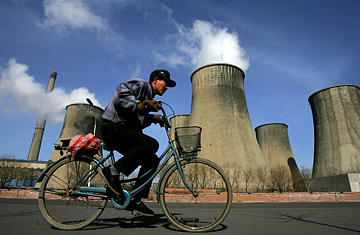
A man cycles past cooling towers of the coal powered Fuxin Electricity Plant in Fuxin, in China's northeast Liaoning province.
Carl Pope, the executive director of the Sierra Club, likes to say that the environmental challenge can be boiled down to a pretty simple question. How are we going to fit a billion new rising consumers — mostly from India and China — into a biosphere that is increasingly full? If the world can make room for the newcomers, then we should be able to make it through the 21st century. If not, it won't matter what we do in the U.S. — the sheer scale of the rising demand for energy and raw materials in the developing will render our actions moot.
Pope's question was at the forefront of a report released today by the InterAcademy Council, a Netherlands-based network of national science academies from around the world. Titled "Lighting the Way: Towards a Sustainable Energy Future," the assessment was the work of 15 scientists from 13 nations — and here's the important part — it was commissioned by the governments of China and Brazil, two future energy superpowers. The recommendations made in the report aren't exactly earth-shattering — you may have heard that we should conserve more — but what matters is the focus on the developing world, as both a market for and a center of energy innovation. "The new frontiers of energy are much more likely to be in China and India and comparable places than in the [developed world]," said Ged Davis, one of the report's panelists and a British energy economist. "This is where the investments for energy are most needed, and this is where I'm convinced they'll be most applied."
The key term is "leapfrog" — or as Davis said later, "super leapfrog." Desperate to keep juice flowing to their rapidly growing economies — in India especially, blackouts remain a fact of life — the big developing nations are adding electrical capacity fast, cheap and dirty. China alone is building a coal plant a week for the next five years, locking in vast levels of carbon dioxide emissions. It would be a big step just to get these economies to the same efficiency and relative cleanliness of developed-world energy systems. Coal plants in Japan, for instance, operate with an efficiency of 40% or better, while Chinese plants are generally much lower. Closing that gap could make a difference — but again, the sheer scale of that growth requires far more. "We need to develop that leapfrog attitude for developing countries," said Jose Goldemberg, the panel's co-chair and a professor at the Institute of Electrotechnics and Energy at the University of Sao Paulo.
That will require massive investment in the energy sector — and the dirty secret is that for all our talk about the importance of new, clean technology, governments around the world have underinvested in energy. The report's authors point out that global public investment in energy research and development was just $9 billion in 2005 — about a billion less than the U.S. is currently spending in Iraq per month. That has to be doubled, at least. "We need money on the magnitude of what the U.S. invested in the Apollo program," said Steven Chu, another co-chair and the director of the Lawrence Berkeley National Laboratory at the University of California-Berkeley. "I'm confident that will lead to a lot of breakthroughs on energy technology."
There's little time to waste. The rapid growth of developing economies presents both an opportunity and a risk in the drive to lower carbon emissions. Unlike sated developed nations, China and India still have massive amounts of energy infrastructure left to build, so if they can be induced to build clean, the future difference would be dramatic. The downside, of course, is that they still have massive amounts of energy infrastructure left to build — a startling realization, considering carbon emissions are already nearing dangerous levels today, even before that transition occurs. Cleaning up the developing world won't be simple, but it's one task we do not want to put off until tomorrow.
